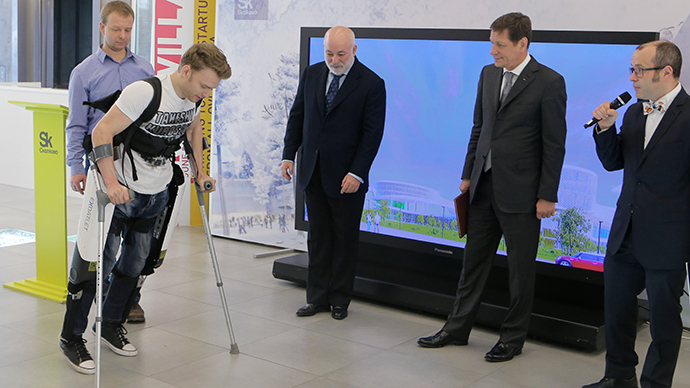Russian start-up to clinically test first human exoskeleton

The clinical trials of Russia’s first exoskeleton, designed for rehabilitation of patients with disorders of the locomotive system, will begin in May at one of the country’s top medical research institutions.
The exoskeleton’s developer, ExoAtlet, a company from state-run innovation hub Skolkovo, said that it agreed on cooperation with the Moscow-based Russian National Research Medical University named after Nikolay Pirogov.
ExoAtlet is designed to assist with verticalization and aiding walking in patients with locomotion disorders of the lower limbs.
The company said that, since September last year, it has received around 700 applications from people willing to participate in the tests.

An expert commission will select the most suitable candidates, who will undergo a 30-hour training course in an exoskeleton under supervision from the medics.
“On a daily basis, we receive letters from people, who want to become EkzoAtlet’s test pilots, undergo rehabilitation and once again [see] what’s it like to be able to walk,” said Ekaterina Bereziy, EkzoAtlet founder and CEO, as cited by Vesti website.
READ MORE: Paraplegic groom walks down aisle thanks to robotic exoskeleton (VIDEO)
The applicants are people who suffer from a variety of spinal cord injuries, cerebral palsy and other neurological disorders, she said.
“We are glad that the clinical research for the ExoAtlet project will be held at a leading medical university in the country. The exoskeleton is now one more step closer to mass production, which means that very soon a lot less people will be limited in their capabilities,” Albert Efimov, the head of robotics science center at Skolkovo, said.
The machinery’s control system is based on signals from torque sensors, electromyograms and brain signals, with the possibility to also use voice control.
“Control algorithms allow to perform the movement with a constant repeat of the natural walk pattern, which speeds up the recovery process of locomotors and nerve systems,” ExoAtlet said on its website.
ExoAtlet delivered the first functional prototype of Russian exoskeleton for medical rehabilitation back in 2013.
In June 2014, the company won the nationwide start-up competition, which was organized by Skolkovo.













